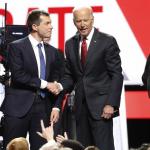The Fierce Urgency of Less

The new moderate meme is that big proposals are not only unenactable but also disqualify those who make them from the presidency. That was the attack that Pete Buttigieg delivered last night against Elizabeth Warren, Bernie Sanders, and Beto O’Rourke. “Why unnecessarily divide this country over health care when there’s a better way to deliver coverage for all?” he asked Warren. “We can’t wait” for more comprehensive programs to be codified and implemented, he told O’Rourke, swatting down Beto’s proposal to outlaw assault weapons.
An unsuspecting reader of Wednesday’s Washington Post would have come across a similar line of attack in an op-ed by former New York mayor and current gazillionaire Michael Bloomberg, who in a fit of Warren-phobia is reported to be considering jumping into the presidential race. “The presidential aspirants are not short on big ideas,” Bloomberg wrote.
But voters must demand they explain how they intend to move from proposing plans to actually implementing them, including passing them through Congress. Those who dodge the question by speaking of revolution and the bully pulpit aren’t up to the job.
(Apparently, Bloomberg thinks neither Theodore nor Franklin Roosevelt was up to the job.)
What underlies these theories of political change are empirically baseless assumptions of a Biden-esque variety—specifically, that more moderate proposals can win Republican support, as they did during Biden’s early years (the 1970s) in Congress. As anyone who’s been at least dimly conscious since the mid-1990s should be able to attest, that world, with that kind of Republican, has vanished tone and tint. Considering that the Affordable Care Act passed without a single Republican in either house voting for it, does Buttigieg really think he can win Republican votes for his own “Medicare for All Who Want It”?
Suppose, however, that the Democrats win control of both houses of Congress next year, and enact Warren’s proposal to eliminate the filibuster, so that they can pass a bill through the Senate with 51 votes. Let’s say Warren is the new president, despite the efforts of Buttigieg and Bloomberg to keep that from happening. She still may not have the 51 Democratic votes to push Medicare for All through the Senate—or, say, to enact a serious wealth tax. Under those circumstances, she’d probably settle for whatever most closely approximates Medicare for All, and perhaps a scaled-back wealth tax, while not abandoning the fight to get stronger legislation in future years.
And despite the objections of Bloomberg and Buttigieg, that’s how you get political change. If you don’t mobilize voters for ambitious change and use the bully pulpit to build support for major reforms, you can’t even get incremental fixes. Consider, for instance, the fight for a $15 minimum wage, which appeared almost fantastical when fast-food workers began demanding it in 2012. If those workers had heeded Buttigieg’s counsel of only demanding what was immediately political feasible—that’s what Mayor Pete means when he counters ambitious proposals with his new catchphrase, “We can’t wait”—they would have demanded an increase in the federal minimum from $7.25 to, say, $7.50. And still, the Republicans would have opposed it (as in fact, congressional Republicans have opposed all efforts to raise the wage over $7.25). Instead, over the subsequent years, the workers persuaded states and cities to phase in a raise to $15.
At bottom, though, the aversions of Mayor Pete and Mayor Mike to the ambitious plans of Sanders and Warren aren’t strategic; they’re ideological and self-interested. Neither believes the American economy needs the upending it requires to produce a more egalitarian economy and politics. Mayor Pete’s campaign funding depends too much on those at the top who don’t wish to relinquish a share of their wealth and power; Mayor Mike is the very personification of the funders Mayor Pete relies on.
So when the three B’s of Fighting for Less—Biden, Bloomberg, and Buttigieg—tell us to demand less, they are laying the groundwork for winning nothing.
Harold Meyerson is editor at large of The American Prospect. His email is hmeyerson@prospect.org. Follow @HaroldMeyerson
